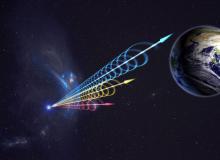News
-

New way to measure a star's gravity could improve hunt for Earth-like planets
January 4, 2016
Astronomers from the University of British Columbia (UBC), Austria, Germany, France and Australia have introduced a new method to measure a star’s surface gravity – which depends on the star’s mass and diameter – to an accuracy of a few per cent. The method—descibed… read more
-

UBC researchers catch rare video of wild seahorse birth
December 21, 2015
The expectant father clings to seagrass and soon tiny creatures resembling filaments of string begin to emerge from deep within a pouch on his abdomen. Within seconds the newborn seahorses are swept away by the fast moving water. Two UBC researchers were fortunate enough to witness this male… read more
-

Predators key to helping prey adapt to climate change
December 16, 2015
The key to helping animals evolve quickly in response to climate change could actually be their predators, according to a new UBC study. The study is one of the first to show that species interactions, meaning the way species interact with each other in an ecosystem, like in a predator-prey… read more
-

Q&A: Travelling back in time with diamonds
December 8, 2015
Diamonds are Maya Kopylova’s best friend, but not for the reasons you might think. Kopylova is a geologist specializing in kimberlites and diamonds. Sifting through core samples that can stretch for kilometres, her lab is discovering how and where diamonds form, and providing a better… read more
-

Astronomers closer to explaining mysterious radio pulses from outer space
December 2, 2015
Astronomers have tied the origin of a Fast Radio Burst to a highly magnetized, gas-filled region of space, providing a new hint in the decade-long quest to explain the mysterious radio pulses. “We now know that the energy from this particular burst passed through a dense magnetized field… read more
-
Made-in-BC prostate cancer drug enters clinical trials
December 2, 2015
A prostate cancer drug bio-prospected and developed by researchers at the University of British Columbia and the BC Cancer Agency (BCCA) is entering human clinical trials. Developed by Marianne Sadar, a researcher with UBC Pathology and Laboratory Medicine and a distinguished scientist at the… read more
-
BC’s latest Rhodes Scholar sets sights on immunology at Oxford
November 30, 2015
A UBC microbiology and immunology student, and coach of the UBC Nordic Ski team, has been named the 2016 Rhodes Scholar for British Columbia. The scholarship will allow Robert Ragotte to pursue post-graduate studies at Oxford, where he intends to study Infection, Immunology, and Translational… read more
-

UBC microbiologists to use ‘reverse vaccinology’ to combat Johne's disease, bovine TB
November 24, 2015
A new $7 million research project led by UBC and University of Saskatchewan microbiologists will use 'reverse vaccinology' in an attempt to develop vaccines for Johne's disease and bovine tuberculosis in cattle. The diseases result in annual losses of $100 million in Canada and billions annually… read more
-

Hummingbirds rely on raw power, not physique, to outmaneuver rivals
November 19, 2015
Brute strength is surprisingly important to the ability of hummingbirds to outmaneuver rivals for nectar and evade predators, according to new University of British Columbia research published in eLife. An intensive study of 20 Anna’s hummingbirds, Calypte anna, reveals that birds with the… read more
-

UBC physicists share in $3M Breakthrough Prize
November 9, 2015
Twenty-nine current and past UBC researchers will each take home a modest share of the $3 million Breakthrough Prize in Fundamental Physics announced yesterday at NASA Ames Research Centre in Moffett Field, California. The high-profile Silicon-Valley funded award is being shared between five… read more